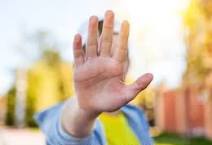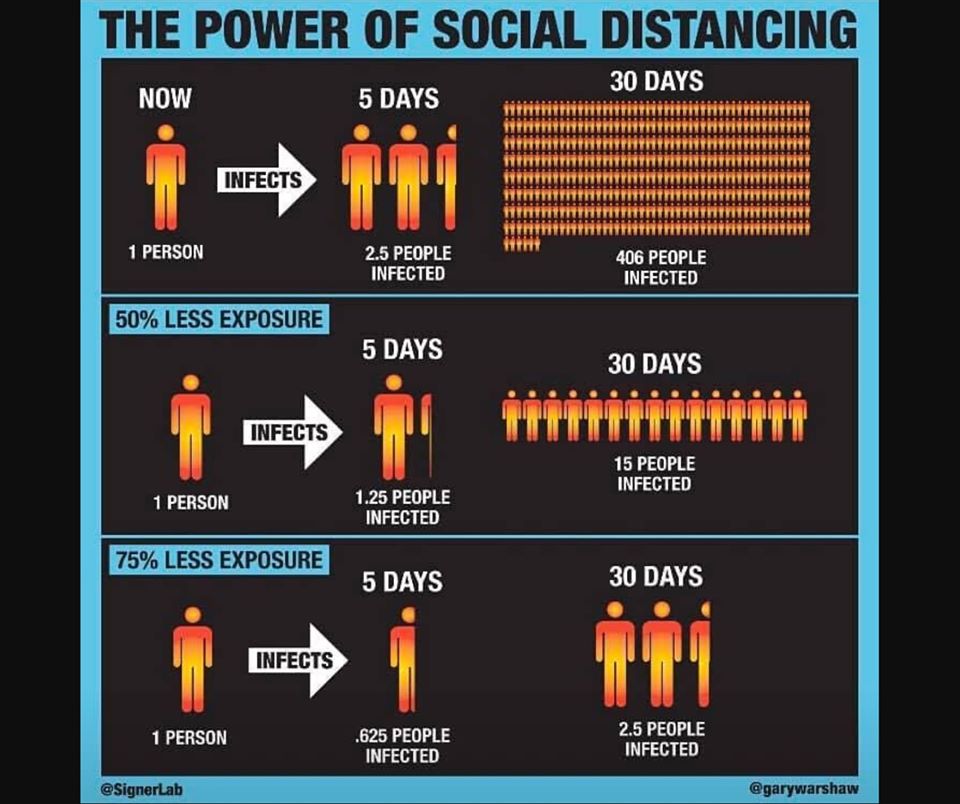FAQs about social distancing
This pages is summarized from It's Time to Get Serious About Social Distancing. Here's How on NPR, March 17, 2020. The bottom 2 FAQs about handwashing and laundromat are from Experts Answer the 16 Burning Questions You Have About Social Distancing from Business Insider.
Here's what the CDC guidelines and other health experts have to say.
|
Can I go to a restaurant?
|
According to present orders on the Navajo Nation and in neighboring states, no — at least not for dining in. We need to use drive-through, pickup or delivery options instead.
When you get home with your food, you could take it out of the containers, throw those out, and then wash your hands thoroughly before eating, We don't want to get too crazy about this, but taking reasonable precautions should be sufficient. Luckily, the food itself is probably not a major risk factor because most infections from the new coronavirus appear to start with the respiratory system, not the digestive tract. |
|
Can I visit Grandma & Grandpa?
|
Stay away from nursing homes and retirement or long-term care facilities unless they're going to provide critical assistance.
This one is tough, because social isolation is already a problem for many of the elderly. But we know there is a large group of infected people — we don't know the exact percent yet — that actually is asymptomatic or has such mild cases, they continue to spread the virus. That includes children. 13% of children with confirmed cases of COVID-19 didn't show symptoms. Given all that, older adults should avoid contact with children. We want to minimize the risk of that child passing on disease to their grandparents, who are at increased risk. That doesn't mean no visits to the grandparents — but do keep younger kids away. (Now may be the time for care packages for elderly relatives, rather than in-person visits). |
|
I'm a healthy grownup, not a kid. Is it OK to visit my elderly relatives?
|
Don't visit older relatives unless it's absolutely necessary — as in, they need food, they need help at home, they need supplies or they need their medications. Every older adult needs to be staying at home right now with plenty of food and medication supplies on hand. And adult children should have back-up plans to care for older parents in case they get sick, since they're the ones at highest risk from the coronavirus.
Do try to stay in touch regularly so that older relatives don't feel too isolated. Now would be a good time to teach your mom and dad how to use video calling if they don't know already. |
|
Is it OK to put my kid in day care?
|
The new CDC guidelines hadn't yet tackled that question. But a commentary in the journal Pediatrics does raise concerns about the spread of the virus in day cares.
Some parents, especially low-income ones, won't have the option of keeping their kids at home with them. In that case, try to find a day care setting with a small number of kids, don't send them to day care if they're sick, and make sure kids have gotten their flu shot (it won't protect them against coronavirus but it is still flu season). And day care providers should wipe down toys, especially plastic ones, often with disinfecting cleaners such as Clorox wipes or a bleach solution. That's because evidence suggests that the coronavirus can live on surfaces like plastic for up to 72 hours. The concern over day cares is because infected people can shed the virus in their stool for several weeks after diagnosis. The most common test for coronavirus can't distinguish whether the virus being shed is alive or dead. This does raise concerns that caretakers changing diapers for kids who aren't yet potty trained could potentially be exposed to the virus. If it's older kids in day care who are all potty trained, it's less of a risk. |
|
Are kids' play dates OK?
|
The CDC didn't offer any official guidance here, but several experts say play dates may defeat the purpose of everyone hunkering down.
Some experts take a strict line and say that play dates inherently have a risk — I don't know how big or small. But if we can put them off for a few weeks and replace it with family time, it would be better. Elementary school-age kids get about five viral infections a season on average. If they're playing with three or four friends, each one would be about to have, had or is getting over a viral illness that they could then, unfortunately, share. And at this moment, it's not just the coronavirus that's a concern, but any virus that might lead a child to need medical attention. That's because you want to avoid doctor's visits if you can, both to avoid possibly getting infected with the coronavirus and to avoid overloading the health care system. Symptoms of COVID-19 on average take five days to show up from the time of infection — but a person can still pass it on to other people during that time. So while it might be tempting to have one or two kids over, don't do it. The goal is for parents to limit exposure, period. The recommendation is, as much as possible, do not have your kids in other people's houses. Do not have other people's kids in your house. There are times where for child care arrangements or for absolute necessity, you need to have one or two or more kids together. But if at all possible, really just keep kids at home. |
|
What about playing outside with other kids or going to the park?
|
If you let your kids outside to play with others, make sure the children keep at least 6 feet of distance from other children (which can be very hard for younger children to abide by). That's because the virus can be transmitted between people who are in close contact with each other -- about a 6-foot radius. Avoid playgrounds and other places that germs can accumulate.
|
|
For adults, can close friends visit?
|
The new CDC guidance is to avoid social visits for now. Once again, think virtual — maybe have a Facetime dinner party with friends.
The answer depends in part on where you live. If there's widespread transmission of the coronavirus in your community, skip the visitors altogether. But if you're in areas where there is less community spread, then limiting visitors rather than eliminating them, is probably a reasonable approach. Limit interactions to one friend at a time. |
|
Can I travel? I'm seeing really cheap airfares now.
|
The CDC is telling people to avoid discretionary travel. Think about it: It can be hard to stay at least 6 feet away from other people on an airplane. And even if you're planning to drive to your destination, the whole goal of this 15-day hunkering down period is to keep your germs to yourself so we slow the spread of the virus — a concept known as flattening the curve. That means minimizing contact with others outside your immediate household.
|
|
I had a doctor's visit scheduled months ago. Should I still go?
|
If it's a nonessential visit to a doctor or dentist, reschedule it. Things that don't need to be done over the next two weeks, don't get it done. If you're a person with an elective surgery, you don't want to go into a hospital right now. People are urged to "be responsible" to free up hospital beds and space.
|
|
I need to go to the grocery store. How do I do that in a way that's safest for me and others?
|
This counts as an essential trip, of course. But try going to the grocery store during off-peak hours, when it's less likely to be crowded, Wipe down the handles on the shopping cart or basket when he shops but hand sanitizer should also work.
Be careful not to touch your face with your hands while you're at the store, and wash your hands before and after going. Try to maintain a distance of at least 6 feet from others. Social distancing doesn't mean no one ever sets foot out the front door. It means being careful. After you unpack the food at home, wash your hands again, If you're in a high-risk group like the elderly or immuno-suppressed, ask someone else to shop for you or having groceries delivered instead. |
|
If I leave the house, how often should I wash my hands?
|
No matter where you go, just always be aware that any surface potentially could be contaminated with a virus, so wash your hands every time you touch something — it's the best way to prevent the spread of the coronavirus.
It's also important to note that drying your hands is just as important as washing them, because germs thrive in moist conditions. Research also shows that wiping your hands with a paper towel eliminates more germs than washing them alone because the friction of drying kills germs. |
|
What about the laundromat?
|
Avoid the laundromat during peak hours to keep a safe distance from other customers. Remember the CDC recommends staying home as much as possible if you are over 60 or have serious chronic medical conditions including heart or lung disease or diabetes.
It's also important to wash dirty laundry on the warmest setting possible and either use gloves when handling dirty laundry or wash your hands after. |


